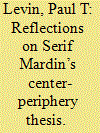| Srl | Item |
| 1 |
ID:
114873


|
|
|
|
|
| Publication |
2012.
|
| Summary/Abstract |
Serif Mardin, one of Turkey's most prominent sociologists, recently stated that 'there is a deep silence about the working class in Turkey'. This article will try to analyse the factors that cause this 'deep silence', which, paradoxically, is observed even by the competing Kemalist and Islamic political actors. In other words, the 'deep silence' refers to the common perspective on the working class of the otherwise different and competing groups. This can be called their solidaristic view, the purpose of which is essentially to provide solidarity among government officials, merchants and peasants that eventually formed the basis of European corporatism. Although it outlines the historical manifestation of the solidarist view, this paper focuses particularly on how Islamic actors maintain that view. This is a problem that requires the examination of various factors around a key question. How is it that competing groups are in harmony in the matter of their ideological positions on the working class?
|
|
|
|
|
|
|
|
|
|
|
|
|
|
|
|
| 2 |
ID:
160434


|
|
|
|
|
| Summary/Abstract |
This article offers a critical rereading of Şerif Mardin’s center–periphery framework. This cleavage has offered a simple and politically appealing theoretical foundation to scholarly and journalistic works for several decades. Empirical evidence, however, suggests institutions and worldviews have not been continuous across time, as the center–periphery framework suggests. Furthermore, disagreements and conflicts among groups perceived as peripheral, the fluidity of relationships between peripheral and central actors, and the lack of cohesion within the institutions of the center leave no reason to maintain the center–periphery cleavage as an organizing framework. The authoritarian turn in Turkey in the 2010s under the Adalet ve Kalkınma Partisi invites further scrutiny of the framework. Future research should take into consideration historical patterns and events that do not fit into the binary framework, pay attention to micro-level dynamics within and between social actors and institutions, incorporate strategic decision making into theoretical models, acknowledge the interconnectedness and hybridity of ideologies and worldviews, and conduct comparative research.
|
|
|
|
|
|
|
|
|
|
|
|
|
|
|
|
| 3 |
ID:
190814


|
|
|
|
|
| Summary/Abstract |
It would be an understatement to say that Şerif Mardin’s center-periphery thesis (CPT) has been influential on contemporary understandings of Turkey. This essay reflects on the impact of the CPT, considers the challenges from both critics and a changing empirical reality, and discusses whether it still has something to offer us today. It argues that some of the criticisms levied at Mardin’s thesis are based on a misunderstanding of the role of simplification in social science, while others point to important shortcomings of the theory without presenting an alternative framework. However, the article suggests that the anomalies in the CPT have by now amassed to the point that it no longer serves as a meaningful approximation of key dynamics in Turkish politics, primarily because it fails to capture the importance of the Kurdish issue and the consolidation of the ruling AKP at the center.
|
|
|
|
|
|
|
|
|
|
|
|
|
|
|
|